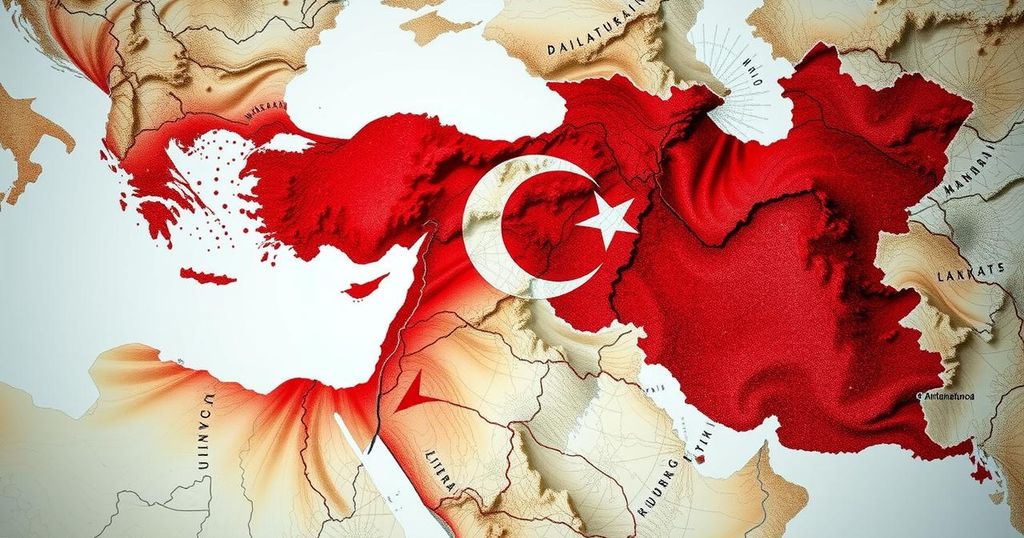The Strategic Implications of Bashar al-Assad’s Downfall for Turkey

The ouster of Bashar al-Assad marks a significant shift in regional power dynamics, enhancing Turkey’s influence while posing strategic challenges for President Erdogan. As Turkey seeks to contain Kurdish factions and address the refugee crisis, the evolving situation will largely depend on Syria’s new leadership and Turkey’s diplomatic strategies.
The recent removal of Bashar al-Assad from power in Syria signifies a transformative shift in regional dynamics, particularly enhancing Turkey’s strategic foothold. Turkish President Recep Tayyip Erdogan’s overtures to collaborate with Assad failed, leading to Assad’s current predicament. With the rapid advance of opposition forces, including Hayat Tahrir al-Sham (HTS), Turkey gains an opportunity for increased influence over its neighbor, a crucial consideration given the extensive border shared by the two nations.
Erdogan’s primary focus remains the containment of the Kurdish People’s Protection Units (YPG), which Ankara associates with the Kurdistan Workers’ Party (PKK), groups deemed terrorist organizations by Turkey and its allies. Following Assad’s departure, Turkish-supported rebels swiftly took Manbij from US-aligned Syrian Democratic Forces (SDF), showcasing Ankara’s assertiveness amid escalating tensions.
According to Didier Billion, deputy director of the French Institute for International and Strategic Affairs, Turkey’s military presence in Idlib and its support of the Syrian National Army (SNA) illustrate Ankara’s awareness and facilitation of HTS’s advances. The Turkish government seeks to solidify a security perimeter along its border to mitigate threats from Kurdish factions. Billion emphasizes Erdogan’s intent to expand areas under Turkish control while asserting pressure on Kurdish forces, potentially setting the stage for territorial fragmentation in Syria.
In addition, Turkey grapples with the substantial number of Syrian refugees—approximately 3 million—residing within its territory. As addressing the refugee issue becomes politically critical in Turkey, Erdogan is likely to pursue the repatriation of some individuals, though many remain hesitant to return to a destabilized Syria.
Erdogan’s recent attempts to mend ties with Moscow and engage with the new Syrian governance may influence future dynamics. While acknowledging Turkey’s elevated position in the immediate aftermath of Assad’s fall, the evolving landscape will depend on the strategies adopted by Syria’s new leadership regarding territorial sovereignty and the status of Kurdish factions.
This tumultuous environment paints Turkey as a significant player, strategically maneuvering to protect its interests, while the actions of the emerging Syrian government and Turkish-Russian relations remain critical factors in the ongoing saga of the region’s geopolitics.
The ongoing conflict in Syria, which began in 2011, has significantly shaped geopolitical relations in the region. Bashar al-Assad’s regime has faced persistent challenges from various rebel factions, with Turkey playing a pivotal role in supporting these opposition groups. The strategic importance of the Syrian conflict is magnified by Turkey’s border with Syria and the presence of Kurdish forces, which Ankara views as a direct threat to its national security. Erdogan’s efforts to maintain influence in Syria amid shifting alliances and the refugee crisis underscores the complexities inherent in the region’s politics, inviting analysis from scholars and policy experts alike.
In conclusion, the fall of Bashar al-Assad opens a new chapter for Turkey, positioning it as a key regional power while simultaneously complicating its long-term strategy regarding Kurdish groups and the influx of refugees. Future developments will hinge on the decisions made by Syria’s new government and the potential for diplomatic negotiations with Ankara. Turkey’s approach will determine not only its immediate strategic successes but also the stability of the wider region in the coming months.
Original Source: www.france24.com








